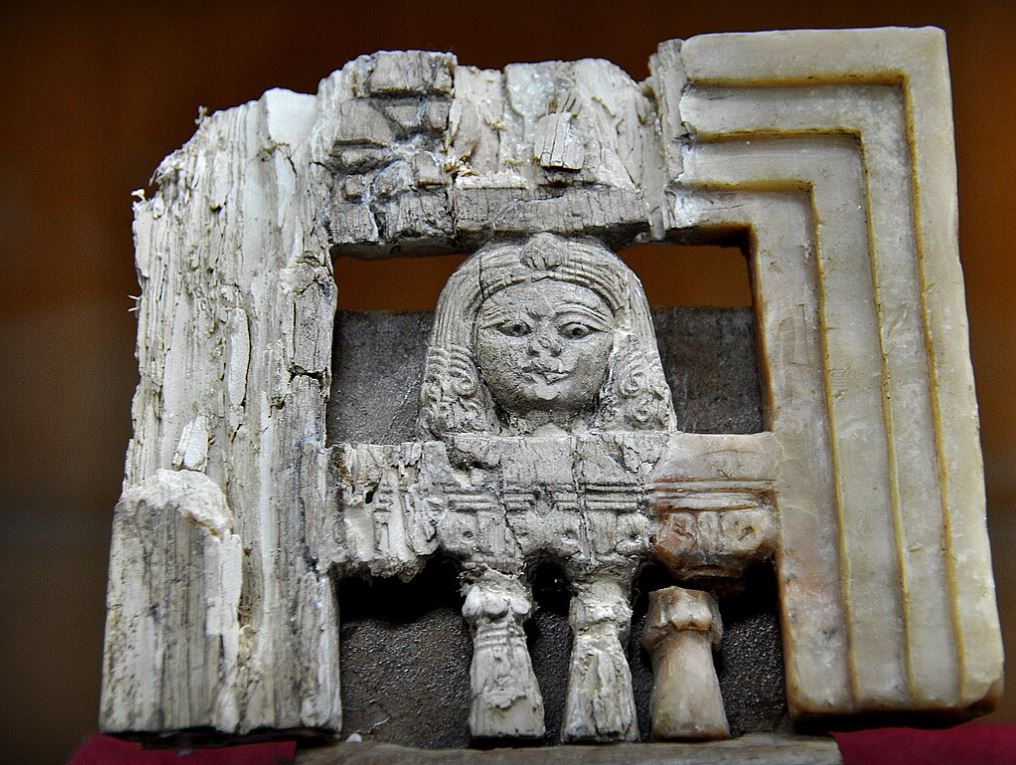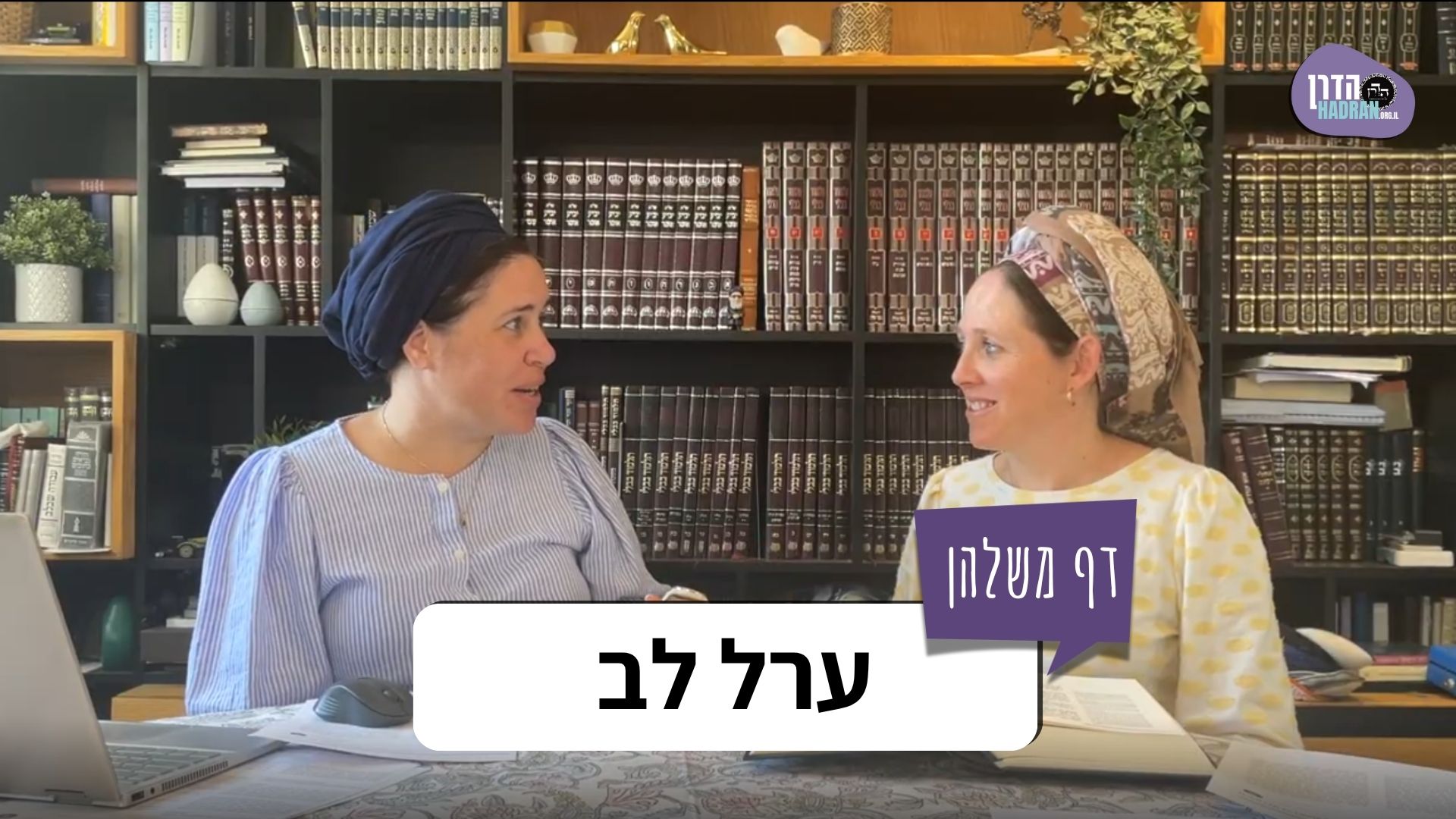This month’s learning is sponsored by Beth Balkany in honor of their granddaughter, Devorah Chana Serach Eichel. “May she grow up to be a lifelong learner.”
Want to dedicate learning? Get started here:

This month’s learning is sponsored by Beth Balkany in honor of their granddaughter, Devorah Chana Serach Eichel. “May she grow up to be a lifelong learner.”
Delve Deeper
Broaden your understanding of the topics on this daf with classes and podcasts from top women Talmud scholars.
New to Talmud?
Check out our resources designed to help you navigate a page of Talmud – and study at the pace, level and style that fits you.
The Hadran Women’s Tapestry
Meet the diverse women learning Gemara at Hadran and hear their stories.
Nazir 5
וְיָלֵיף ״יָמִים״ ״יָמִים״ מִבָּתֵּי עָרֵי חוֹמָה. מָה הָתָם שְׁנֵים עָשָׂר חֹדֶשׁ — אַף כָּאן שְׁנֵים עָשָׂר חֹדֶשׁ.
And Rabbi Yehuda HaNasi derives the meaning of the term yamim stated with regard to Absalom based upon a verbal analogy from the word yamim that appears in the context of houses of walled cities, where it states: “For a full year [yamim] he shall have the right of redemption” (Leviticus 25:29). Just as there, in the case of walled cities, the term yamim means twelve months, as the verse states immediately afterward: “Within the space of a full year” (Leviticus 25:30), so too here, in the case of Absalom, the term yamim means twelve months.
רַבִּי נְהוֹרַאי אוֹמֵר: מְגַלֵּחַ אַחַת לִשְׁלשִׁים יוֹם. רַבִּי יוֹסֵי אוֹמֵר: מְגַלֵּחַ מֵעֶרֶב שַׁבָּת לְעֶרֶב שַׁבָּת, שֶׁכֵּן מָצִינוּ בִּבְנֵי מְלָכִים שֶׁמְּגַלְּחִים מֵעֶרֶב שַׁבָּת לְעֶרֶב שַׁבָּת.
Rabbi Nehorai says: Absalom cut his hair once every thirty days. Rabbi Yosei says: He cut his hair from one Shabbat eve to another Shabbat eve, as we find that the sons of kings cut their hair from one Shabbat eve to another Shabbat eve.
מַאי טַעְמָא דְּרַבִּי — יָלֵיף מִבָּתֵּי עָרֵי חוֹמָה. וְהָא רַבִּי הוּא דְּאָמַר: אֵין ״יָמִים״ פְּחוּתִין מִשְּׁנַיִם!
The Gemara asks: What is the reasoning of Rabbi Yehuda HaNasi? He derives the meaning of the verse concerning Absalom from the verse concerning houses of walled cities. But isn’t it Rabbi Yehuda HaNasi himself who said that one may not redeem his house until it has been in the buyer’s possession for at least two days, as the word yamim does not refer to fewer than two days? This demonstrates that Rabbi Yehuda HaNasi understands the word yamim in the case of walled city houses as referring to a period of two days rather than a year. How then can he employ a verbal analogy from houses of walled cities to derive that the word yamim in the case of Absalom indicates a period of twelve months?
הַאי גְּזֵירָה שָׁוָה מִשּׁוּם כּוֹבֶד גְּמִיר, וּבִשְׁנֵי יָמִים לֵיכָּא כּוֹבֶד.
The Gemara answers: He learned this verbal analogy because the verse states that Absalom would trim his hair due to its weight (II Samuel 14:26), and in two days there is no significant weight added to the hair. Consequently, the term yamim cannot be understood to mean two days in the case of Absalom.
וְאֵימָא שְׁתֵּי שָׁנִים, דִּכְתִיב: ״וַיְהִי מִקֵּץ שְׁנָתַיִם יָמִים״?! דָּנִין ״יָמִים״ שֶׁאֵין עִמָּהֶן שָׁנִים מִ״יָּמִים״ שֶׁאֵין עִמָּהֶן שָׁנִים, וְאַל יוֹכִיחַ זֶה שֶׁיֵּשׁ עִמּוֹ שָׁנִים.
The Gemara asks: But say that yamim means two years, as it is written: “And it came to pass at the end of two years of days [yamim]” (Genesis 41:1). The Gemara rejects this: We derive the meaning of the term yamim in a case where it does not have the term years mentioned with it, as in the case of Absalom, from another usage of the term yamim that does not have the term years mentioned with it, i.e., the verse about houses of walled cities. And this usage of the term yamim that does have the term years mentioned with it will not prove otherwise.
וְאֵימָא שְׁלֹשִׁים יוֹם, דִּכְתִיב: ״עַד חֹדֶשׁ יָמִים״! דָּנִין ״יָמִים״ שֶׁאֵין עִמָּהֶם חֳדָשִׁים מִ״יָּמִים״ שֶׁאֵין עִמָּהֶם חֳדָשִׁים, וְאַל יוֹכִיחַ זֶה שֶׁיֵּשׁ עִמּוֹ חֳדָשִׁים.
The Gemara asks: But say that yamim means thirty days, as it is written: “But a month of days [yamim]” (Numbers 11:20). The Gemara rejects this: We derive the meaning of the term yamim in a case where it does not have the term months mentioned with it from another usage of the term yamim that does not have the term months mentioned with it. And this usage of the term yamim that does have the term months mentioned with it will not prove otherwise.
וְאֵימָא מֵהָכָא: ״מִיָּמִים יָמִימָה וְגוֹ׳״, דָּנִין ״יָמִים״ מִ״יָּמִים״, וְאֵין דָּנִין ״יָמִים״ מִ״יָּמִימָה״.
The Gemara asks: But say that Rabbi Yehuda HaNasi should have derived the meaning of the term yamim from here: “The daughters of Israel went from time to time [yamim yamima] to lament the daughter of Jephthah the Gileadite four days in a year” (Judges 11:40). This teaches that the daughters of Israel would go four times a year, each time for one day, to lament her, in which case yamim yamima means once every three months. The Gemara rejects this: We derive the meaning of the term yamim from another usage of the term yamim, and we do not derive the meaning of the term yamim from a case where the word yamim is used in conjunction with the term yamima.
וּמַאי נָפְקָא מִינַּהּ, וְהָא תָּנָא דְּבֵי רַבִּי יִשְׁמָעֵאל: ״וְשָׁב הַכֹּהֵן״ ״וּבָא הַכֹּהֵן״, — זוֹ הִיא שִׁיבָה זוֹ הִיא בִּיאָה!
The Gemara raises a difficulty: And what is the difference between yamim and yamima? Didn’t the school of Rabbi Yishmael teach a verbal analogy with regard to leprosy of houses between the words “and the priest shall return [veshav]” (Leviticus 14:39) and the words “and the priest shall come [uva]” (Leviticus 14:44)? It is derived from this that just as this is the halakha with regard to returning, i.e., the priest returns after seven days, this is the halakha with regard to coming, which is also after seven days. Just as the Hebrew words veshav and uva can be used in a verbal analogy, certainly two words with a less pronounced variation, i.e., yamim and yamima, can be used to teach a verbal analogy.
הָנֵי מִילֵּי הֵיכָא דְּלֵיכָּא דְּדָמֵי לֵיהּ, אֲבָל הֵיכָא דְּאִיכָּא דְּדָמֵי לֵיהּ — מִדְּדָמֵי לֵיהּ יָלְפִינַן.
The Gemara responds: This applies only where there are no terms that are identical to it. However, where there are terms that are identical to it, we derive the meaning of a term from the usage of terms that are identical to it rather than from the usage of terms that are merely similar.
אִיכָּא דְּאָמְרִי: מְנָא יָדְעִינַן דְּכֹל תְּלָתָא יַרְחִין חַד זִימְנָא? דִּילְמָא אַרְבְּעָה זִימְנֵי בְּשַׁתָּא, (אִי נָמֵי) אַרְבְּעָה יַרְחִין חַד זִימְנָא, תְּרֵין יַרְחִין בְּחַד זִימְנָא!
Some say that the reason the halakha is not derived from yamim yamima is because the time period to which it refers is unclear: From where do we know that they would lament Jephthah’s daughter once every three months, at fixed intervals? Perhaps they would lament her four times a year, in irregular intervals. Alternatively, it might have taken place in regular but uneven intervals, e.g., after four months they would visit one time, and then after two months they would visit one time, and then they would visit again after a four-month interval and again after a two-month interval.
רַבִּי נְהוֹרַאי אוֹמֵר: מְגַלֵּחַ אַחַת לִשְׁלֹשִׁים יוֹם. מַאי טַעְמָא? גַּבֵּי כֹהֲנִים מִשּׁוּם דְּאִיכָּא כּוֹבֶד, הָכָא נָמֵי אִיכָּא כּוֹבֶד.
It was taught in the baraita that Rabbi Nehorai says that Absalom cut his hair once every thirty days. The Gemara explains the basis for this opinion: What is the reason that with regard to priests, the halakha is that they must cut their hair every thirty days? It is because after that interval there is noticeable weight to the hair. Here, too, in the case of Absalom, there is noticeable weight after this period of time has passed, and it is clear that Absalom cut his hair due to its weight, as it is stated: “Because the hair was heavy on him, therefore he polled it” (II Samuel 14:26).
רַבִּי יוֹסֵי אוֹמֵר: מְגַלֵּחַ מֵעֶרֶב שַׁבָּת לְעֶרֶב שַׁבָּת. מַאי אִיכָּא בֵּינֵיהּ לִשְׁאָר אֲחוֹהִי!
It was taught in the baraita that Rabbi Yosei says: Absalom cut his hair from one Shabbat eve to another Shabbat eve, as the sons of kings would cut their hair every Shabbat eve. The Gemara asks: If so, what difference is there between Absalom, who was a nazirite, and the rest of his brothers, King David’s sons, who also cut their hair once a week?
יוֹם טוֹב שֶׁחָל לִהְיוֹת בְּאֶמְצַע שַׁבָּת, דַּאֲחוֹהִי מְגַלְּחִין, הוּא לָא מְגַלַּח. אִי נָמֵי: לְגַלּוֹחֵי מִן צַפְרָא דְּמַעֲלֵי שַׁבְּתָא, אֲחוֹהִי מְגַלְּחִין, אִיהוּ לָא מְגַלַּח עַד פַּנְיָא.
The Gemara answers: There is a difference between them with regard to a Festival that occurs in the middle of the week, as his brothers would cut their hair in honor of the Festival, whereas he would not cut his hair. Alternatively, the difference between them concerns cutting hair on the morning of Shabbat eve. His brothers would cut their hair at that hour, whereas he would not cut his hair until the evening, shortly before Shabbat.
הָנֵי אַרְבָּעִים שָׁנָה, מַאי עֲבִידְתַּיְיהוּ? רַבִּי נְהוֹרַאי אוֹמֵר מִשּׁוּם רַבִּי יְהוֹשֻׁעַ: לְקֵץ אַרְבָּעִים שָׁנָה שֶׁשָּׁאֲלוּ לָהֶן מֶלֶךְ. תָּנָא: אוֹתָהּ שָׁנָה שֶׁשָּׁאֲלוּ לָהֶן מֶלֶךְ הִיא שְׁנַת עֶשֶׂר לִשְׁמוּאֵל הָרָמָתִי.
Having mentioned in 4b the verse “and it came to pass at the end of forty years, that Absalom said unto the king” (II Samuel 15:7), the Gemara asks: With regard to these forty years, what is their purpose in this discussion, i.e., to what time period do they refer? The Gemara answers: Rabbi Nehorai says in the name of Rabbi Yehoshua: It is referring to the end of forty years, since the Jewish people requested for themselves a king in the days of Samuel (see I Samuel, chapter 8). It was taught: That year when they requested for themselves a king was the tenth year of the leadership of Samuel the Ramathite.
מַתְנִי׳ סְתַם נְזִירוּת שְׁלֹשִׁים יוֹם.
MISHNAH: In the case of unspecified naziriteship, where one does not state how long he wishes to be a nazirite, the term lasts for thirty days.
גְּמָ׳ מְנָהָנֵי מִילֵּי? אָמַר רַב מַתְנָא, אָמַר קְרָא: ״קָדוֹשׁ יִהְיֶה״ — ״יִהְיֶה״ בְּגִמַטְרִיָּא תְּלָתִין הָווּ.
GEMARA: The Gemara asks: From where are these matters derived, that an unspecified naziriteship is thirty days? In answer to this question, Rav Mattana said: The verse states with regard to a nazirite: “He shall be [yihye] holy” (Numbers 6:5), and the numerical value [gimatriyya] of the letters of the word yihye is thirty.
בַּר פְּדָא אָמַר: כְּנֶגֶד ״נָזִיר״ ״נִזְרוֹ״ הָאֲמוּרִים בַּתּוֹרָה, שְׁלֹשִׁים חָסֵר אַחַת.
Bar Padda said: The number of days of an unspecified naziriteship corresponds to the number of appearances of the words “nazirite,” “his naziriteship,” and similar terms that are stated in the Torah in the chapter of naziriteship (Numbers, chapter 6): Thirty less one times. So too, an unspecified term of naziriteship is twenty-nine days.
וְרַב מַתְנָא נָמֵי, נֵילַף מִ״נָּזִיר״ ״נִזְרוֹ״!
The Gemara asks: And Rav Mattana should also derive from the number of times that the words “nazirite” and “his naziriteship” appear, to conclude like bar Padda that an unspecified naziriteship lasts for twenty-nine days.
אָמַר לָךְ, הַהוּא לִדְרָשָׁה: ״מִיַּיִן וְשֵׁכָר יַזִּיר״ — לֶאֱסוֹר יֵין מִצְוָה כְּיֵין רְשׁוּת, ״כִּי יַפְלִא לִנְדֹּר נֶדֶר נָזִיר לְהַזִּיר״ — מְלַמֵּד שֶׁהַנְּזִירוּת חָלָה עַל נְזִירוּת.
The Gemara answers: Rav Mattana could have said to you: That word is needed for a specific exposition. The words: “He shall abstain [yazir] from wine and strong drink” (Numbers 6:3), comes to prohibit a nazirite from drinking wine that is consumed for a mitzva just as he is prohibited from drinking wine whose consumption is optional. Likewise, the words: “When either man or woman shall clearly utter a vow, the vow of a nazirite, to consecrate himself” (Numbers 6:2), teach that one vow of naziriteship takes effect where another vow of naziriteship already exists. For example, if one takes a vow by stating: I will be a nazirite today, and then repeats the vow, he must observe two periods of naziriteship. Consequently, since sometimes the word nazirite, in its different forms, appears in order to serve as the source of a particular exposition, the number of times it occurs does not indicate the length of an unspecified term of naziriteship.
וּבַר פְּדָא אָמַר לָךְ: לֵיכָּא חַד מִינְּהוֹן דְּלָאו לִדְרָשָׁא? אֶלָּא מִדְּהָהוּא לְמִנְיָינָא, כּוּלְּהוּ נָמֵי לְמִנְיָינָא.
And bar Padda could have said to you that although some of these verses are required for an exposition, is there not at least one of them that is not used for an exposition? Rather, since that usage of the term nazirite is stated to indicate the number of days in an unspecified term of naziriteship, all of the other usages of the term are also stated to indicate the number of days in an unspecified term of naziriteship in addition to the specific halakhot that are derived from them.
תְּנַן: סְתַם נְזִירוּת שְׁלֹשִׁים יוֹם. בִּשְׁלָמָא לְרַב מַתְנָא — נִיחָא, אֶלָּא לְבַר פְּדָא — קַשְׁיָא!
The Gemara analyzes the opinions of Rav Mattana and bar Padda in light of the mishna and relevant baraitot. We learned in the mishna: An unspecified naziriteship lasts for thirty days. Granted, according to Rav Mattana it works out well. However, according to bar Padda it is difficult, since in his opinion the mishna should have stated that an unspecified naziriteship lasts for twenty-nine days.
אָמַר לָךְ בַּר פְּדָא: אַיְּידֵי דְּאִיכָּא יוֹם תְּלָתִין דִּמְגַלֵּחַ וּמֵבִיא קׇרְבְּנוֹתָיו, מִשּׁוּם הָכִי תְּנָא שְׁלֹשִׁים.
The Gemara answers: Bar Padda could have said to you: The principal days of naziriteship are twenty-nine days. However, since there is the thirtieth day, when the nazirite shaves his hair and brings his offerings, and the prohibitions of naziriteship remain in effect on that day until he has brought these offerings, due to that reason the tanna teaches that an unspecified naziriteship lasts for thirty days.
תְּנַן: מִי שֶׁאָמַר ״הֲרֵינִי נָזִיר״ — מְגַלֵּחַ יוֹם שְׁלֹשִׁים וְאֶחָד. בִּשְׁלָמָא לְרַב מַתְנָא נִיחָא, אֶלָּא לְבַר פְּדָא קַשְׁיָא!
The Gemara asks: We learned in a mishna (16a): One who said: I am hereby a nazirite, shaves his hair on the thirty-first day. Granted, according to Rav Mattana this works out well, since one must finish his term of naziriteship, which lasts for thirty days, before he can shave his hair. However, according to bar Padda, it is difficult. Why doesn’t he shave his hair on the thirtieth day?
אָמַר לָךְ בַּר פְּדָא, אֵימָא סֵיפָא: אִם גִּילַּח לְיוֹם שְׁלֹשִׁים — יָצָא. אֶלָּא סֵיפָא מְסַיְּיעָא לֵיהּ, רֵישָׁא — נַעֲשָׂה כְּאוֹמֵר ״שְׁלֵימִין״.
The Gemara answers: Bar Padda could have said to you in response: Say the latter clause of that mishna: If he shaved his hair on the thirtieth day, he has fulfilled his obligation. This indicates that the naziriteship itself lasts only twenty-nine days. Rather, the latter clause of that mishna certainly supports his opinion. As for the first clause, the reason a nazirite must wait until the thirty-first day in order to shave his hair ab initio is as follows: Since one who specifies that he is becoming a nazirite for thirty complete days may shave his hair only on the thirty-first day, the Sages ruled that even one who did not specify a time period becomes like one who said explicitly that he will be a nazirite for thirty complete days. Consequently, he may shave his hair ab initio only after thirty days have passed.
וּלְרַב מַתְנָא קַשְׁיָא סֵיפָא! קָסָבַר מִקְצָת הַיּוֹם כְּכוּלּוֹ.
The Gemara asks: And for Rav Mattana, the latter clause of the mishna is difficult, since it states that one who shaves his hair on the thirtieth day has fulfilled his obligation, whereas Rav Mattana claims that his naziriteship is not yet complete at that time. The Gemara answers: He holds that the legal status of part of the day is like that of an entire day. Although the term of naziriteship is thirty days, once the thirtieth day begins it is as though it has been completed, and a nazirite who shaves his hair on that day has fulfilled his obligation.
תְּנַן: ״הֲרֵינִי נָזִיר שְׁלֹשִׁים יוֹם״, אִם גִּילַּח יוֹם שְׁלֹשִׁים — לֹא יָצָא! בְּאוֹמֵר ״שְׁלֵימִין״.
The Gemara asks further: We learned in that same mishna: In the case of one who says: I am hereby a nazirite for thirty days, if he shaved his hair on the thirtieth day, he has not fulfilled his obligation. This appears to contradict the opinion of Rav Mattana, who holds that part of the day is like an entire day. The Gemara answers: This is referring to one who says that he will be a nazirite for thirty complete days, in which case he certainly does not fulfill his obligation by shaving his hair on the thirtieth day itself.
תְּנַן: מִי שֶׁנָּזַר שְׁתֵּי נְזִירוּת — מְגַלֵּחַ אֶת הָרִאשׁוֹנָה יוֹם שְׁלֹשִׁים וְאֶחָד, וְהַשְּׁנִיָּה לְיוֹם שִׁשִּׁים וְאֶחָד. בִּשְׁלָמָא לְרַב מַתְנָא — נִיחָא.
The Gemara asks further: We learned in that mishna: One who accepted two terms of naziriteship shaves his hair for the first naziriteship on the thirty-first day, and he shaves his hair for the second term on the sixty-first day. Granted, according to Rav Mattana this works out well, since he shaves his head for the first naziriteship after a full thirty days have passed. The second term of naziriteship then commences on that day, which is the thirty-first day since he took his vows. He then shaves for the second time on the thirty-first day of his second naziriteship, which is the sixty-first day since he took his vows.

































